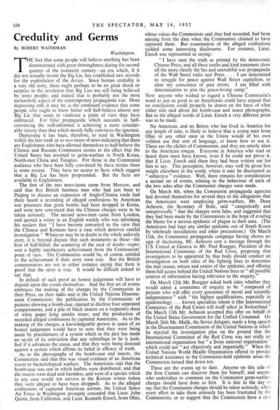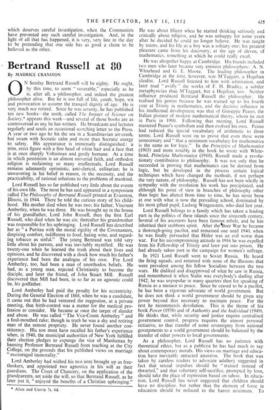Credulity and Germs
By ROBERT WA1THMAN
Washington. THE fact that some people will believe anything has been demonstrated with great thoroughness during the second quarter of the twentieth century—an era which, if it did not actually invent the Big Lie, has established new records for the exploitation of the device. Since human credulity is a very old story, there ought perhaps to be no great shock or surprise in the revelation that Big Lies are still being believed by some people; and indeed that is probably not the most melancholy aspect of the contemporary propaganda war. More depressing still, it may be, is the continued evidence that some people who ought to know better will half-believe almost any Big Lie that tends to vindicate a point of view they have embraced. For false propaganda which succeeds in half- convincing the well-informed is achieving a more consider- able victory than that which merely fully convinces the ignorant.
Depressing it has been, therefore, to read in Washington within the last week or so two items of news indicating that there are Englishmen who have allowed themselves to half-believe the Chinese and Russian Communist stories to the effect that the United States has resorted to germ-warfare in North Korea, North-east China and Tsingtao. For those in the Communist audience who have been fully convinced by these stories there is some excuse. They have no access to facts which suggest that a Big Lie has been propounded. But the facts are available to Englishmen.
The first of the two news-items came from Moscow, and said that five British business men who had just been to Peiping to discuss an expansion of Anglo-Chinese trade had there heard a recording of alleged confessions by American war prisoners that germ bombs had been dropped in Korea, and were now convinced that the Chinese charges were to be taken seriously. The second news-item came from London, and quoted a writer in an English weekly who was informing his readers that "I have become converted to the view that the Chinese and Koreans have a case which deserves careful investigation." Whatever may be in doubt in the whole unlovely story, it is beyond dispute that such testaments as these—the hint of half-belief, the scattering of the seed of doubt—repre- sent a highly satisfactory achievement from the Communists' point of view. The Communists would be, of course, entitled to the achievement if their story were true. But the British commentators are not in either instance saying that there is proof that the story is true. It would be difficult indeed to say that.
In default of such proof an honest judgement will have to depend upon the events themselves. And the first set of events embraces the making of the charges by the Communists in their Press, on their radio and in the United Nations Disarma- ment Commission; the publication by the Communists of pictures showing a bomb-case, opened to disclose four separated compartments, and a pile of black insects on a (separate) sheet of white paper lying amidst straw; and the production of recorded alleged confessions by captured Americans. As to the making of the charges, a knowledgeable person in quest of an honest judgement would have to note that they were being made by practitioners of a system which in the past has made no secret of its conviction that any subterfuge or lie is justi- fied if it advances the cause, and that they were being directed against a system which affirms its belief in efficacy of truth. As to the photographs of the bomb-case and insects, the Communists said that this was visual evidence of an American resort to bacteriological warfare. The Americans said that the bomb-case was one in which leaflets were distributed, and that the insects were dead and harmless, and were of a species which in any case would not survive in the Korean winter (when they were alleged to have been dropped). As to the alleged confessions of captured American airmen, the United States Air Force in Washington promptly conceded that Lieut. John. Quinn, from California, and Lieut. Kenneth Enoch, from Ohio, whose voices the Communists said they had recorded, had been missing from the date when the Communists claimed to have captured them. But examination of the alleged confessions yielded some interesting disclosures. For instance, Lieut. Enoch was represented as saying : "I have seen the truth as printed by the democratic Chinese Press, and all these truths and kind treatment show all the more clearly the lies and untruthful war propaganda of the Wall Street radio and Press. . . . I am determined to struggle for peace against Wall Street capitalism, to clear my conscience of past errors. I am filled with determination to join the peace-loving camp."
Now anyone who wished to regard a Chinese Communist's word as just as good as an Ameritan:s could have argued that no conclusions could properly be drawn on the basis of what either side said about the bomb-case and insect photographs. But in the alleged words of Lieut. Enoch a very different point was to be made.
No American, and no Briton who has lived in America for any length of time, is likely to believe that a young man from Ohio or any other state in the Union would of his own volition use that sort of language, or know how to use it. These are the clichés of Communism, and they are utterly alien to the American tongue. Everyone in America who read or heard them must have known, even if he could not prove it, that if Lieut. Enoch said, them they had been written out for him to say. This perception, however, may well be given less weight elsewhere in the world, where it may be discounted as " subjective " evidence. Well, there remains for consideration a second set of events, relating to the behaviour of each of the two sides after the Communist charges were made.
On March 4th, when the Communist propaganda agencies had devoted themselves for several days to the allegations that the Americans were employing germ-warfare, Mr. Dean Acheson, the Secretary of State, said "categorically and unequivocally" that the charges were false, and suggested that they had been made by the Communists in the hope of evading the blame for a serious epidemic of plague in their area. (The Americans had kept any similar epidemic out of South Korea by wholesale inoculations and other precautions.) On March 11th, the Communist propaganda campaign having shown no sign of slackening, Mr. Acheson sent a message through the U.S. Consul at Geneva to Mr. Paul Ruegger, President of the International Committee of the Red Cross, proposing that investigators to be appointed by that body should conduct an investigation on both sides of the fighting lines to determine the real causes, nature and extent of the epidemic, and offering them full access behind the United Nations lines to " all possible sources of information having relevance to the enquiry."
On March 12th Mr. Ruegger asked both sides whether they would admit a committee of enquiry to be "composed of persons who will offer every guarantee of moral and scientific independence" with "the highest qualifications, especially in epidemiology. . . known specialists whom it (the International Committee of the Red Cross) will itself select in Switzerland." On March 13th Mr. Acheson accepted this offer on behalf of the United States Government for the Unified Command. On March 26th Mr. Malik, the Soviet delegate, made a long speech in the Disarmament Commission of the United Nations in which he rejected the investigation plan on the ground that the International Committee of the Red Cross was not really an international organisation but "a Swiss national organisation" which could not "act objectively and impartially." When the United Nations World Health Organisation offered to provide technical assistance in the Communist-held epidemic areas the Communists turned that down too.
These are the events up to date. Anyone- on this side of the Iron Curtain can discover them for himself; and anyone who undertakes to comment on the Communist germ-warfare charges should have done so first. It is late in the day to say that the Communist charges should be taken seriously, when every effort to take them seriously has been frustrated by the Communists; or to suggest that the Communists have a case which deserves careful investigation, when the Communists have prevented any such careful investigation. And, in the light of all that has happened, it is very, very late in the day to be pretending that one side has as good a claim to be believed as the other.



































 Previous page
Previous page